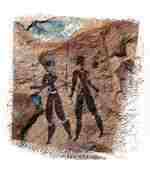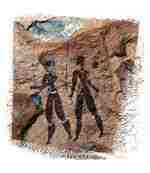While researching my current work in progress, a historical novel about slavery at the Cape of Good Hope in South Africa, I came upon this poem published in 1945 in Phylon, a magazine dedicated to race and culture.
My novel is almost ready now (fourth draft) and I was looking for epigraphs to put at the beginning of each chapter.

Middle Passage
by Robert Hayden
It was long, long after the burnished riding of those conquering kings,
the poems, the sacred images of bronze,
the jewel-dark wisdom of that fabulous queen.
It was long, long after that they came with guns, disease,
in ships with death for figurehead,
stained sails and Christ spreadeagled in the cordage. Long, long after…
And we had forgotten our sires’ plumed and charioted splendor,
our past an ivory image buried under jungle leaves,
and our god false to us, our kings betraying us.
I.
Jesus, Estrella, Esperanza, Mercy:
Sails flashing to the wind like weapons,
sharks following the moans, the fever and the dying;
horror the corposant and compass-rose.
Voyage through death
to life upon these shores.
“Tenth April Eighteen Hundred:
Blacks rebellious. Crew uneasy. Our linguist says
their staunchless moaning is a prayer for death,
ours and their own. Some try to starve themselves.
Lost three this morning leaped with crazy laughter
to the waiting sharks; sang as they went under.”
Desire, Adventure, Tartar, Ann:
Standing to America, bringing home
black gold, black ivory, black seed.
Deep in the festering hold thy father lies,
of his bones New England pews are made;
those are altar lights that were his eyes.
Jesus Saviour Pilot Me
Over Life’s Tempestuous Sea
We pray that thou wilt grant, O Lord,
safe passage to our vessels bringing
heathen souls unto thy comforting.
Jesus Saviour
“Midnight: I cannot sleep, for I am sick with fear, but
writing eases fear a little, since still my eyes can see these
words take shape upon the page; and so I write, as one
would turn to exorcism. Four days scudding, but now the
sea is calm again. Ill luck follows in our wake like sharks
(our grinning tutelary gods). Which one of us has killed an
albatross? A plague among our blacks-ophthalmia: blind-
ness-and we have jettisoned the blind to no avail. It spreads
(Christ, help us), spreads. Its claws have scratched sight
from the Captain’s eyes, and there is blindness in the
fo’c’sle; and we must sail three weeks before we come to
port. What port awaits us, Davy Jones’ or home? I’ve heard
of slavers drifting and drifting-stricken wanderers, play-
things of wind and storm, their crews gone blind,
savage jungle hatred crawling up on deck . . .”
Thou Who Walked On Galilee
We bring from hideous Africa
the black race, demon-souled, to thee, to thee.
Jesus Saviour Pilot Me
“Deponent further sayeth that said brig
the Bella J. sailed from the Guinea coast
with cargo of five hundred blacks and odd
for the barracoons of Florida:
“That there was scarcely room ‘tween-decks for half
the sweltering cattle stowed spoon-fashion there;
that some went made of thirst and tore their flesh
and sucked the spurting blood:
“That crew and Captain lusted with the comliest of
the heathen girls kept naked in the cabins;
that there was one they called the Guinea Rose,
and they cast lots and fought to lie with her:
“That when the Bo’s’n piped all hands, the flames,
spreading from starboard, already were beyond control,
the negroes screaming in the hold, their chains
entangled with the flames:
“That said black men could not be reached;
that the crew abandoned ship, leaving
the shrieking negresses behind:
“That two hundred thousand dollars in
prime slaves were lost;
that six white men did perish drunken with the wenches.
“Further Deponent sayeth not….”
Pilot Oh Pilot Me
Voyage through death
to life upon these shores.
II.
Borne from that land-
O Ancient mother made the whore of greed,
of death the glittering concubine;
O fiery kingdoms dazzling-dark with sun,
thy smouldering riches cursing and consuming thee-
Our gods false to us, our kings betraying us
for rum and mirrors, muskets and a dream of power.
Rio Pongo Gambia Whydah Calabar,
Gold Coast and Ivory Coast:
wound-vivid points upon the map of man’s cruelty to man.
“Aye, lad, and I have seen those factories,
have seen the mongos skilled at setting traps
of war wherein the feuding blacks, victor and vanquished,
were caught as prizes for our barracoons.
“Fieldhands for Georgia gentlemen,
footmen for the senor.
black girls to please a gentleman
and comb his lady’s hair.
Now who will buy, now who will buy? Come buy, 0.
“Have seen the nigger kings whose greed and vanity
turned the wild black hides to gold for us.
And there was one-King Anthracite we called him-
fetish face beneath French parasols
“Of brass and orange velvet; impudent mouth
whose cups were carved from human skulls:
would honor us with drum and feast and conjo
and palm-oil-glistening wenches skilled in love.
“And for tin crowns that shone with paste,
red calico and German-silver trinkets,
would have the drums talk war and send
his spearmen on the sleeping villages.
“And they would burn the papery villages
and kill the sick and old and lead the young
in coffles to our factories …
“Twenty years in that trade, twenty years;
and it was like the song says, lad:
“Oh, I’d ninety bars of gold, as I sailed
and riches manifold as I sailed, as I sailed,
and wealth beyond control, as I sailed.
“For there was gold a-plenty to be harvested
from nigger-flesh, and I’d be trading still
but for the fever melting down my bones.”
Our gods false to us, our kings betraying us,
scattering us like seeds
to flower stubbornly in alien ground.
III.
Shuttles in the rocking loom of history,
the dark ships move, the dark ships move,
their bright ironical names
like kindness on a murderer’s mouth;
plough through thrashing glister toward
fata morgana’s lucent, melting shore,
weave toward New World littorals that are
mirage and myth and actual shore.
Voyage through death,
voyage whose chartings are unlove.
A charnel stench, effluvium of living death
spreads outward from the hold,
where the living and the dead, the horribly dying,
lie interlocked, lie foul with blood and excrement
and stink like animals.
Deep in the festering hold thy father lies;
the corpse of mercy rots with him;
rats eat love’s rotting gelid eyes.
But, oh, the living look at you
with human eyes whose suffering accuses you,
whose hatred reaches through the swill of dark
to strike you like a leper’s claw.
You cannot stare that hatred down,
nor chain the fear that stalks the watches
and breathes on you its fetid scorching breath;
cannot kill the deep immortal human wish,
the timeless will.
“But for the storm that threw up barriers
of wind and wave, senores, the Amistad
would have reached the port of Principe
in two, three days at most; but for the storm
we should have been prepared for what befell.
Swift as the tiger’s leap it was, verdad.
There was that interval of moonless calm
filled only with the water’s and the rigging’s
sound-then suddenly a low and savage
snarl-it was no human sound, verdad-
and they had leapt upon us with machete
and marlinspike. It was as though the air
itself were striking us. We were no match
for them. Our crew, exhausted by the struggle
with the storm, went down before the blacks.
Selestino our mulatto cook,
ran from below with gun and lantern,
and I saw, before the cane knife’s blinding
shock of pain, Cinquez, this surly black
who calls himself a prince, foremost in
the ghastly work and shouting orders to
the others in his barbaric tongue. I saw
him back the poor cook down, and then he turned
on me. The decks were slippery
when daylight came. It sickens me to think
of it. The savages threw overboard
the butchered bodies of our men
like so much jetsam-bodies of Christian men
despatched unshriven by the heathen slaves.
Basta. The rest is quickly told,’ senores:
How Cinquez spared Don Jose and me
to steer the Amistad to Africa,
and how we voyaged east by day and west
by night, deceiving them, hoping for rescue,
prisoners on our own vessel that,
like a phantom schooner doomed to portless seas,
wandered the Atlantic till at length
we drifted to the shores of this your land,
America, where we were freed from our
unspeakable misery.
Now we demand,
senores, the extradition of Cinquez
and his accomplices to La Havana.
And it distresses us to know there are
so many here inclined to justify
and praise the mutiny of these treacherous blacks.
We find it strange and paradoxical
that you whose wealth, whose very liberty
are rooted in the labor of your slaves-
and justly so-should suffer the senor
John Quincy Adams to speak so passionately
of the right of slaves to kill their masters,
and with his lavish rhetoric weave
a hero’s garland for Cinquez.
Jus suum is the view of the viejo;
it is not ours, and we are determined
to return to Cuba with our slaves
and there see justice done. Cinquez
will die, senores, be assured he will .. .”
The deep immortal human wish,
the timeless will:
Cinquez its superb Homeric image,
life that transfigures many lives,
life that defines our history upon these shores.
Borne from that land-
our gods false to us, our kings betraying us-
like seeds the storm winds carry
to flower stubbornly upon these shores.
For more information click here
https://www.poetryfoundation.org/harriet-books/2011/04/middle-passage-robert-hayden


Wow Connie, what a find! This poem is visceral…so much to take in. And congrats on your almost ready novel. Looking forward to reading it, one day. 🙂
LikeLiked by 1 person
Thanks for reading and for your response. Visceral is the word. It makes you think, doesn’t it.
LikeLike